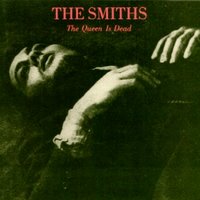The Smiths The Queen is Dead
 “In 10 years’ time the Smiths will be viewed in the same way that the Beatles are now viewed” ~ Nick Kent, The South Bank Show, 1987
“In 10 years’ time the Smiths will be viewed in the same way that the Beatles are now viewed” ~ Nick Kent, The South Bank Show, 1987 Well, it is now nine years since 1997 and while the general populace are familiar with “John, Paul, George and Ringo”, “Morrissey, Johnny, Andy and Mike” still doesn’t really strike a chord. Kent is now no doubt embarrassed by his comparison, but it’s quite apt – both the Beatles and the Smiths were two quintessentially British guitar bands and both were centred on songwriting duos of rare genius. The Beatles may have enjoyed greater commercial success, but the Smiths, England’s premier indie-rock band of the 1980s, are their equals in quality and I applaud Nick Kent for his audacity.
Though all their albums are excellent (“filler” was not a word in Steven Patrick Morrissey’s and Johnny Marr’s vocabulary), 1986’s The Queen Is Dead is surely the Smiths’ masterpiece. A mature third album, it flows beautifully from one track to the next, and although there are some obvious highlights, all the songs are top-drawer material and together form a fantastic album. Here, Marr manages to incorporate some adventurous instrumentation such as strings (performed by The Hated Salford Ensemble AKA Johnny Marr on a synthesiser) into the Smiths sound, where previously embellishment was kept at a minimum outside guitar overdubs.
The album’s two singles rank among the finest pop songs of the 1980s. Opening with a furiously strummed acoustic guitar the energetic Bigmouth Strikes Again is Morrissey’s probable apology for his then-frequent and inappropriate public outbursts. It is also vintage Morrissey with its playfully dramatic vocal and scrumptiously sardonic humour. The poppy The Boy With A Thorn In His Side cracked the British Top 30, but by rights should’ve topped the charts (along with countless other Smiths singles, but I digress…). Yet though the Smiths have often been characterised as primarily a singles band, The Queen is Dead yields other rewards.
Disenchantment with Queen and Country has always been one of Morrissey’s recurring lyrical themes, and it comes full circle on the title track. The Queen is Dead is not just a diatribe against the degenerate monarchy - it’s an indictment of 1980’s Britain as a whole - Thatcherism, Church greed and the moral bankruptcy of the English populace. A live favourite, Marr’s composition is the perfect compliment to Morrissey’s lyric - a menacing, quasi-tribal rhythm courtesy of bassist Andy Rourke and drummer Mike Joyce combined with frantic, post-punk guitar and some strings thrown in for good measure.
A quick glance through the lyric sheet would give the instant impression that Morrissey enjoys writing from the position of a hapless romantic and his outpourings would get tiresome for the listener if they were not undercut with sly humour. Despite the grand, funereal monsters I Know It’s Over and Never Had No One Ever, The Queen is Dead is a predominantly funny album. Queen Elizabeth and Prince Charles are skewered on the title track; Geoff Travis, boss of Rough Trade records and “flatulent pain in the arse” gets what’s coming to him on the music hall pastiche Frankly Mr Shankly; a transvestite clergyman makes an appearance on Vicar In A Tutu, the album’s mandatory rockabilly romp; on the brilliantly-titled Some Girls Are Bigger Than Others, Moz even references a scene from a Carry On comedy. Being one of the most literate rock stars that ever was, Morrissey has a tendency to cite and quote from his favourite books and films and Cemetry Gates is his opportunity to drop a few names, quote Shakespeare and extol his personal idol, Oscar Wilde.
The album’s masterpiece, There is a Light That Never Goes Out is more than just one of the Smiths’ greatest songs - it’s one of the greatest songs, period. It is a love song of the highest order, set against majestic layers of acoustic guitars, keyboards and strings. Morrissey, ever the morbid romantic, begs an addressee to take him away from his dark house and show him the big lights. He doesn’t care where they go, as long as it will enable him to confirm his place in the land of the living. Quite ironic, given the song’s anthemic chorus:
And if a double decker bus
Crashes into us
To die by your side
Is such a heavenly way to die
And if a ten ton truck
Kills the both of us
To die by your side
The pleasure and the privilege is mine
A little on the melodramatic side, sure, but Morrissey’s romanticism is far from what you’d expect from a Diane Warren-penned power ballad. It's a track you won’t be likely to hear on Love Songs Coast-to-Coast and most deservedly so.
The Queen Is Dead is the one Smiths album you’d be likely to see in the top 20 of those Top 100 Albums of All Time lists that Q Magazine trots out every few months. Whether or not it’s the best thing the Smiths ever released is the fan’s decision - the important thing is that it’s a bloody marvellous listen and worth getting reacquainted with on this, the 20th anniversary of its release.
This review was published, with minor alterations, in Craccum, Issue 13, 2006.


1 Comments:
What a great site Wellbutrin sexual dysfunction Mercedes benz body panels Change ipod battery debt solutions airline jobs Bontril refills Chicago cubs wool and leather coach's jacket digital printing virus scan stop smoking program http://www.ffxi-hentai.info
By Anonymous, at 11:32 pm
Anonymous, at 11:32 pm
Post a Comment
<< Home